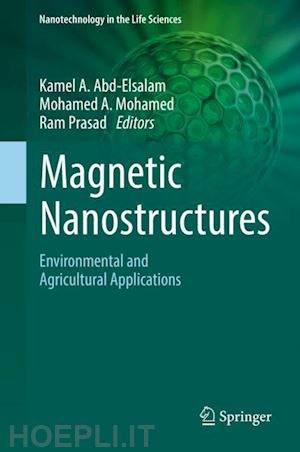
Questo prodotto usufruisce delle SPEDIZIONI GRATIS
selezionando l'opzione Corriere Veloce in fase di ordine.
Pagabile anche con Carta della cultura giovani e del merito, 18App Bonus Cultura e Carta del Docente
Recently, magnetic nanostructures have gained a remarkable interest for basic research and applied studies. Because of their low cost and ease of manufacture and modification, they have great potential for agricultural and environmental applications. The use of magnetic nanostructures has been proven in a wide range of fields including catalysis, biotechnology, biomedicine, magnetic resonance imaging, agriculture, biosensors, and removal of environmental pollutants, among others.
This book includes 16 chapters of collected knowledge, discoveries, and applications in agriculture, soil remediation, and water treatment. It describes the role of nano-agriculture with regard to food security and discusses environmental and agricultural protection concerns. It further offers potential applications of magnetic nanomaterials in the agriculture and food sectors, such as the development of sensors, environment monitoring for wastewater treatment and the remediation of contaminated soils. Increasing crop yield through the use of nanopesticides or nanofertilizers and biosecurity using sensors for detecting pathogens along the entire food chain are discussed as well.
This book also brings together various sources of expertise on different aspects magnetic nanostructure application in the agri-food sector and environment remediation. Magnetic nanostructures also have great potential in biotechnological processes, as they can be utilized as a carrier for enzymes during different biocatalytic transformations. Novel magnetic nanomaterials can be used for detection and separation of pesticides from environmental and biological samples. The excellent adsorption capacity of the modified magnetic nanoadsorbents together with other advantages such as reusability, easy separation, environmentally friendly composition, and freedom of interferences of alkaline earth metal ions make them suitable adsorbents for removal of heavy metal ions from environmental and industrial wastes. One of the most important environmental applications of magnetic nanostructures has been in the treatment of water, whether in the remediation of groundwater or through the magnetic separation and/or sensing of contaminants present in various aqueous systems.
The integrated combination of these 16 chapters, written by experts with considerable experience in their area of research, provides a comprehensive overview on the synthesis, characterization, application, environmental processing, and agriculture of engineered magnetic nanostructures. Its comprehensive coverage discusses how nanostructure materials interact in plants as well as their potential and useful applications.
Preface
1. Nanomagnetism, phenomena and applications
Abdelmoez Hussein, School of Metallurgy and Materials, Birmingham University, Edgbaston B15 2TT, Birmingham, England, E-mail: a.a.m.a.hussein@bham.ac.uk; abdmoez_hussien@science.sohag.edu.eg
2. Magnetic nanoparticles as probe tools for biological and environmental systems applications
Oumarou Savadogo, Department of Chemical Engineering, Polytechnique Montre´al, C.P. 6079, Succursale Centre-ville, Montreal, QC H3C 3A7, Canada, E-mail: osavadogo@polymtl.ca
3. Pesticide degradation from contaminated soil by using Biobgenic and Magnetic nano-structures
4. Magnetic nanoparticles: a new unique gene delivery system in plant science
Mohamed A. Mohamed, Universidad Politecnica de Valencia-IBMCP/(UPV-CSIC), Spain; Plant Pathology Research Institute-Agricultural Research Center (ARC), Cairo, Egypt; Email: mohammed_sharouny@yahoo.com
5.
Mohamed A. Mohamed
Molecular Mechanism of Plant–magnetic Nanoparticle Interactions
Universidad Politecnica de Valencia-IBMCP/(UPV-CSIC), Spain.
Plant Pathology Research Institute-Agricultural Research Center (ARC), Cairo, Egypt
E-mail: mohammed_sharouny@yahoo.com
6.
Kamel Abd-Elsalam
Micro/Nano Biochar for Sustainable Plant Health: Present Status and Future Prospects
Plant Pathology Research Institute, Agricultural Research Center (ARC), Egypt
Unit of Excellence in Nano-Molecular Plant Pathology Research Center – Plant Pathology Research Institute, 9 Gamaa St., 12619 Giza, Egypt
E-mail: kamelabdelsalam@gmail.com
7.
Theivasanthi T.
Magnetic nanoparticles as plant growth promoting agents.
International Research Center
Kalasalingam University, Krishnankoil – 626126, INDIA
Email: ttheivasanthi@gmail.com
8.
Poonam NehraAntimicrobial activity of magnetic nanoparticles
School of Biomedical Engineering
National Institute of Technology, Kurukshetra, Haryana, India
Email: poonamnehra007@gmail.com 9.Mubarak Mujawar
Magnetic Nano adsorbents for Heavy Metals
Department of Chemical Engineering, Faculty of Engineering and Science, Curtin University, Sarawak, 98009, Malaysia
10.
Malik Badshah
Impact of magnetic nanoparticles on biofuels production
Department of Microbiology
Quaid-i-Azam University Islamabad, 45320, PakistanEmail: malikbadshah@qau.edu.pk
11.
Siavash Iravani
Bio-based synthesis of magnetic nanoparticles and their applications
Faculty of Pharmacy and Pharmaceutical Sciences, Isfahan University of Medical Sciences
Email: siavashira@gmail.com
12.
Kanti Bhooshan Pandey
Plant mediated synthesis, applications and challenges of magnetic nanostructures
CSIR-Central Salt & Marine Chemicals Research Institute
Gijubhai Badheka Marg,
Bhavnagar-364002, Gujarat
Email: kantibiochem@gmail.com
13.
Iffat Naz
Water purification using magnetic nanomaterials
Department of Agricultural Engineering, Bahauddin Zakariya University, Bosan Road, Multan 60800, Pakistan Email: iffatkhattak@yahoo.com
14.
Muhammad Zahid
Metal ferrites and their graphene based nanocomposites: Synthesis, characterization and applications in wastewater treatment
Department of Chemistry, University of Agriculture Faisalabad, Pakistan
Email: zahid595@gmail.com
15.
Jhonatan L. Fiorio
Shape-controlled syntheses of Magnetic Nanoparticles and their Environmental Applications
Departamento de Química Fundamental, Instituto de Química, Universidade de São Paulo, Av. Prof. Lineu Prestes, 748, 05508-000 São Paulo, SP, Brazil)
Email: jhonatan@iq.usp.br
16.
Shrivas, Kamlesh
Novel magnetic nanomaterials for separation and detection of pesticides from environmental and biological samples
Department of Chemistry, Guru Ghasidas Vishwavidyalaya, Koni, Bilaspur, CG, India
Email: kshrivas@gmail.com
Index











Il sito utilizza cookie ed altri strumenti di tracciamento che raccolgono informazioni dal dispositivo dell’utente. Oltre ai cookie tecnici ed analitici aggregati, strettamente necessari per il funzionamento di questo sito web, previo consenso dell’utente possono essere installati cookie di profilazione e marketing e cookie dei social media. Cliccando su “Accetto tutti i cookie” saranno attivate tutte le categorie di cookie. Per accettare solo deterninate categorie di cookie, cliccare invece su “Impostazioni cookie”. Chiudendo il banner o continuando a navigare saranno installati solo cookie tecnici. Per maggiori dettagli, consultare la Cookie Policy.